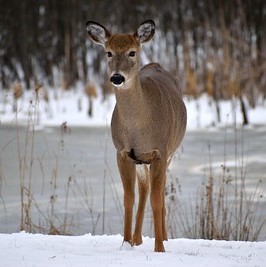
The Wisconsin Department of Natural Resources (DNR) has confirmed chronic wasting disease (CWD) in a wild deer for the first time in Waupaca County, which is in central Wisconsin, west of Green Bay.
The deer was a 2-year-old doe harvested by a hunter in the northwestern part of the county, within 10 miles of the borders with Shawano, Marathon, and Portage counties. The DNR did not specify when the deer was killed nor when tests came back positive for CWD.
CWD is an always-fatal prion disease that affects members of the deer family. It has not been reported in people, but scientists fear it one day may make the jump to humans, as happened with bovine spongiform encephalopathy (BSE, or "mad cow" disease), which is also caused by a prion.
Baiting and feeding encourages deer to congregate unnaturally around a shared food source where infected deer can spread CWD.
State law requires a 3-year ban on baiting and feeding in the affected county and all counties that lie within 10 miles of the CWD detection. Baiting and feeding, however, were already banned in Waupaca County since 2014 because of nearby detections, and that ban will now be extended. Likewise, Shawano, Marathon, and Portage counties were already under such bans.
"Baiting and feeding encourages deer to congregate unnaturally around a shared food source where infected deer can spread CWD through direct contact with healthy deer or indirectly by leaving behind infectious prions in their saliva, blood, feces, and urine," the DNR said.
The DNR and the Waupaca County Deer Advisory Council will hold a public meeting in Manawa on Feb 8, during which officials will provide information about CWD in Wisconsin, local CWD testing efforts, and disease surveillance options.











